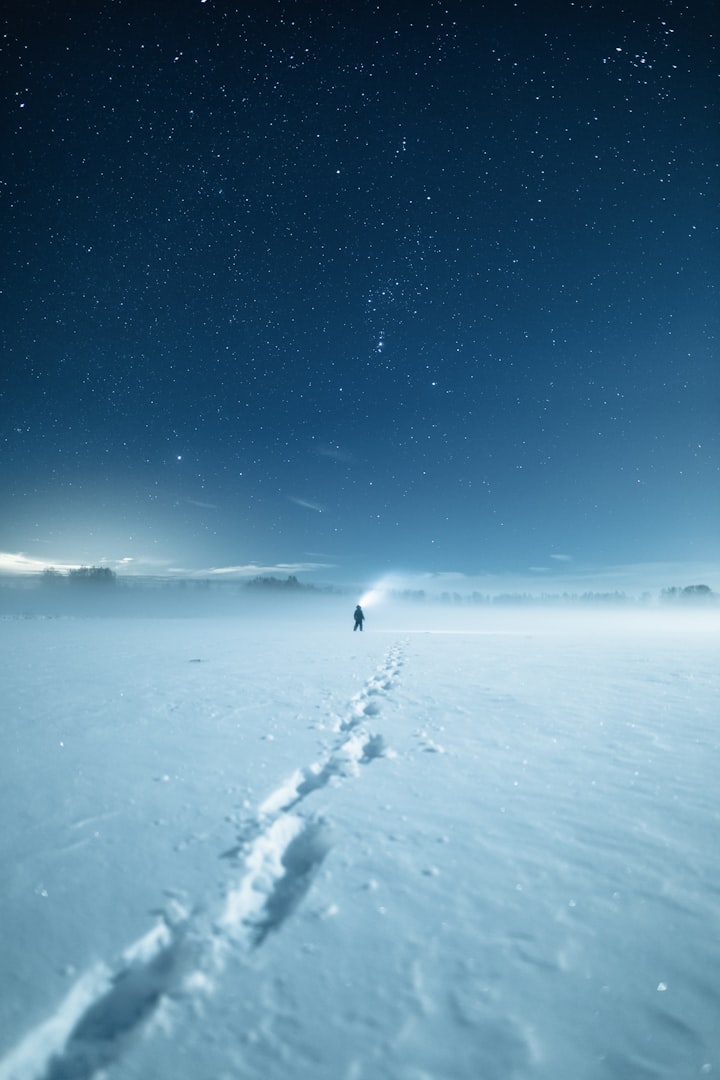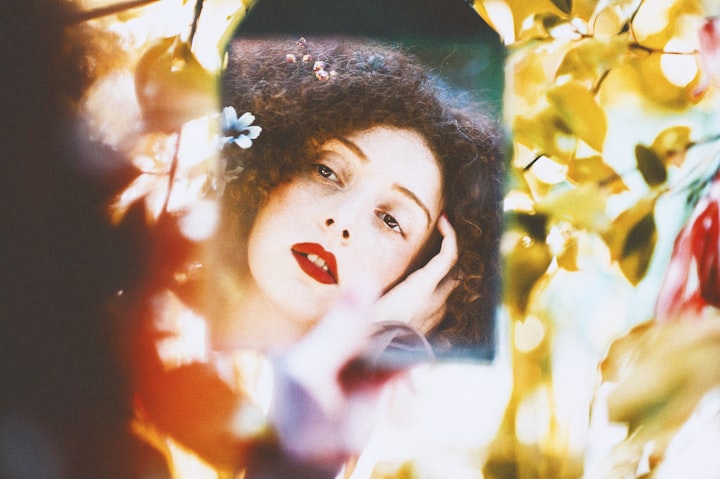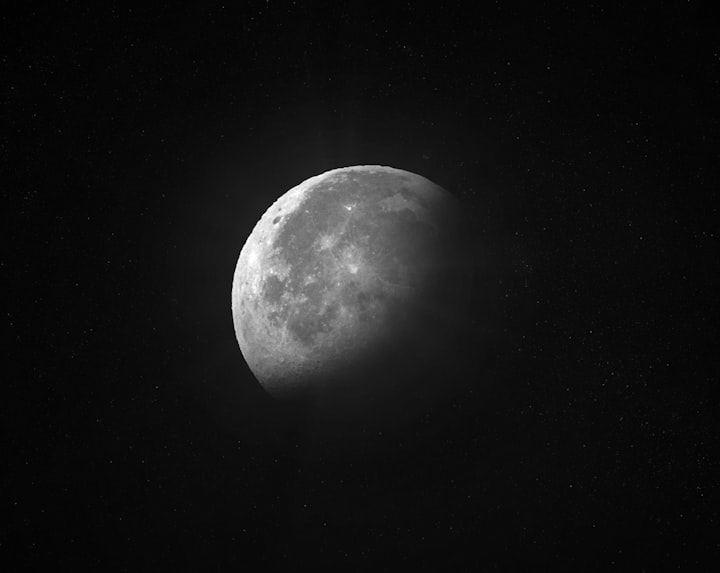White Out
The blizzard inside is colder

My high beams hit the front porch like spotlights on a stage. The cop squints my way. Aunt Martha waves. She’s wearing a puffy down vest over pajamas tucked into winter boots two sizes too big. I kill the engine and roll into her driveway. The snow makes a muffled crunch beneath the tires. More snow is falling. The path is disappearing into white. Earlier in the week, I shoveled a strip from the house to the driveway down to the mailbox so Aunt Martha wouldn’t fall and break a bone. Now that seems the least of her dangers.
“Art’s gone,” she says simply.
I nod, introduce myself to the cop. “Her nephew?” he says like that’s so hard to believe. I must look like a dick to him in my good coat and loafers. We shake. I try to give a firm grip. He’s wearing gloves thick as catchers’ mitts.
“I came as soon as she called,” I say.
I keep my distance from the cop and hold my breath when I talk so he won’t smell the Jameson’s. Not that I’m faded, far from it. I only had two shots but I don’t want to give the wrong impression. The cop goes over the sequence of events. I wrap my arm around Aunt Martha’s shoulders. She feels so small. When I was a kid I thought of her as sturdy. She was big boned and broad faced. Dad used to describe his sister-in-law as “strong stock.” I feel her shivering bones like sticks beneath her marshmallow coat.
“Why don’t we go inside,” I say.
The cop waits in the front hall. Aunt Martha lets me steer her back to the den. I sit her down in the La-Z-Boy and turn on the television. She stares at the screen. It might as well be a stain on the wall. I don’t even try to separate her from her down vest. It’s almost one in the morning and the corners in the old house hold the chill. I turn up the thermostat and find the cop looking at framed photos on the hall table.
“That you?” he asks pointing to a picture that is obviously not me. As a detective, he sucks.
“Would you like a cup of coffee?”
Bryce the cop says yes. He pulls out a kitchen chair while I dig through Aunt Martha’s cupboards looking for a coffee maker. I find one of those old aluminum percolators. I struggle to put the pieces together. The hole in the metal basket seems too big because when I put it on the stem thing it slides slowly down to the bottom of the pot. I think it’s missing a little widget of some sort so paw through a junk drawer looking for something but I really have no idea what.
“Instant’s fine,” Bryce says.
I find a jar of Folger’s crystals and put two mugs in the microwave.
“Does she have anyone else?”
“Just me,” I say. “My cousin -- her oldest -- died in the first Iraq. She has a daughter my age; ran away when we were teens. She shows up every once in a while looking for drug money. It’s sad. She’s pretty messed up.”
“Oh, yeah. I’ve seen that type of thing before,” Bryce says slapping his big cop gloves on the kitchen table. “Seen a lot of things.”
He’s a little older than me, maybe mid 40s with a scraggly blond stash going gray. On the front of his jacket is an Heurtown Police Department patch shaped like the state with blue writing and a little red star in the general vicinity of the town. If I saw him in the right bar, I might hit on him. But the guy doesn’t have a clue. I doubt he’s seen things. I doubt he’s seen much of anything at all.
“You take sugar?”
Bryce takes sugar. I find Aunt Martha’s sugar bowl with the chipped lid. I open two more cabinets looking for the matching creamer before I realize Bryce is watching me with a semi-smirk on his face, and I think I must look like a fussbudget tool. I grab an open carton of half-and-half from the fridge and put it down in the middle of the table. We’re just two men having a casual cup of coffee, two guys shooting the breeze.
The microwave dings. I hand him the mug with 4-H on the front. It’s got to be from when my cousins and I were kids and raised prize-winning chickens. I take the mug with yellow smiley faces. The inside is stained. Aunt Martha doesn’t own a dishwasher. No clothes dryer either since hers broke last summer. She refused to let me buy a replacement, said it wasn't worth it. She hung the wash on a clothesline in the backyard every week until temperatures dropped. In early November, I came to find the sheets and towels on the line stiff as boards.
Bryce doctors his coffee in silence; a bit of cream, two spoons of sugar, stir, taste, more cream. He wraps his right hand around the entire coffee cup. I try the same in manly imitation. It’s damn hot.
“She shouldn’t be alone,” the cop says.
“I drive up from the city every other weekend. I shop for her, do things around the house, mostly cleaning,” I say. “She won’t let me hire help.”
One summer I went through everything in the attic with Aunt Martha and Uncle Art. We spread it out on the front yard for a sale. Ski boots from the ‘70s, bent aluminum pie pans, a grungy pink bath mat, a pair of orange and brown ceramic lamps that were hideous when new and age had done nothing to improve. “Fifty years of accumulated crap,” said Uncle Art. They both laughed. They stood side by side on the lawn for a few minutes in silence, surveying the stuff of their lives. I think they were disappointed to realize it amounted to so little.
“Old people can be stubborn,” Bryce says
“Young people, too.”
Bryce nods, raises his coffee cup in agreement.
“Still,” he says, “she needs someone here and it sounds like you aren’t around all that much, and even when you are . . . “
“I just dropped by The Stage for a minute,” I say. “I was only gone an hour. Hour and a half, max.”
“The Stage Bar and Grill?”
He makes the place sound smoky and possibly evil instead of a fluorescent-lit former grange hall and stagecoach stop where a bunch of guys in snowmobile suits drink Millers. After a day with Aunt Martha I needed a stiff drink, and she didn’t believe in alcohol. It wasn’t a religious thing. She just never saw the point. She and Art drank a bottle of cheap champagne on their wedding night. Art told the story at their anniversary party. “She falls asleep,” he said. “And he blames the champagne,” she said. Everyone laughed. I think theirs was a genuinely happy marriage.
“Yeah, the Stooge Tavern,” I say, and the cop seems to like that I know the locals’ nickname for the place. “I ran into a friend and had to buy a round.”
I think the cop knows I’m telling the truth but not the whole truth but we leave it there. Bryce drinks his coffee slowly, smoothing his mustache between each sip.
“They’re saying a blizzard tomorrow, maybe Tuesday,” he says.
“I heard that,” I say.
Snow settles in the corners of the kitchen windows forming white frames around the black night. We both look out like there’s something to see. Aunt Martha hung a bird feeder in the window above the kitchen sink. She likes to watch the chickadees while she’s washing dishes. Uncle Art always said it was unnatural to feed wild animals. Once he complained to me in front of his wife, “She’s messing with evolution and survival of the fittest.” Aunt Martha said she didn’t believe in Darwin. Uncle Art said he didn’t believe in God. “Maybe that’s because you aren’t evolved,” Aunt Martha said. They both laughed. That’s how it was with them.
“I pulled the squad car to the edge of the field,” Bryce says. “I blasted my brights. I figured if he wandered off like she says, I’d of seen him, or least some trace of him. Alls I saw was a four-point buck spooked still as a statue looking straight my way.
“If I weren’t the law,” he says, his mustache curling up in a smile, “we’d be eating venison burgers right about now.”
I laugh way too hard. He waits for me to stop.
“No footprints. Nothing. So I start deducing maybe your Uncle Art didn’t just wander off.”
I nod.
“I’m a regular Sherlock Holmes,” he says.
It takes me a second to realize he’s making a self-deprecating joke. I force a smile. He means to say that any idiot would figure out Uncle Art did not go gently into the night. I take a sip from my coffee. It tastes like dirty cardboard.
“She’s called before, you know,” he says. “Reported a prowler. An officer races over here, cherry flashing, and your aunt acts surprised, tells him there’s been some mistake, he’s got the wrong address. He calls dispatch. It’s the right place, alright.”
“I didn’t know that.”
“It’s the truth.”
I nod. I sure as hell don’t want to give the impression I doubt his word. The snow on my shoes is melting through the leather; Cole Haan tassel loafers for chrissake. I must look like one of those urban assholes that consider winter an inconvenience to endure between the Beemer and the office. He must think I’m a tool. One time when I visited the farm, Uncle Art and Aunt Martha greeted me on the front porch. “He looks like one of those fancy boys,” Art said. Aunt Martha shushed him, told him, “That’s how they dress in the advertising world.” I never knew if they knew.
The cop takes a long drink from his coffee, downs nearly half a cup in one go. He’s got a bit of cream on his mustache. I wonder if I should tell him. Suddenly a commercial erupts from the next room and I remember Aunt Martha. I consider going in to turn down the volume but the commercial ends and all goes quiet, and it’s just Bryce the cop and me again, sitting around the kitchen table. I uncross my legs. I don’t think instant coffee packs enough punch to keep me up all night but I don’t want to risk lying in Aunt Martha’s guest room staring jittery at the ceiling. I hold the mug to my mouth but barely wet my lips.
“Another time, she thought she was having a heart attack,” says Bryce. “The EMTs find her baking in the kitchen like nothing’s doing. She offers them fresh corn muffins. They figure she’s lonely but warn her not to call again unless it’s an honest to God emergency. The boy who called wolf, ya know.”
“I know.”
I wrap both hands around the coffee hoping the heat will finally warm me through. Bryce looks me straight in the eye. I hold his gaze. His eyes are the most amazing blue. I think we’re flirting.
“So where’s the uncle?”
“Dead,” I blurt out. It sounds so brutal. I add, “He died.”
“Dead people usually do that.”
I laugh. It comes out a nervous giggle. I swallow some coffee. The stuff is truly rank.
“You know I’ve got to call county,” Bryce says.
“I know,” I say, though I don’t know. I don’t even know what “call county” means but figure this is out of Bryce’s jurisdiction or something. The coffee is scrambling my brain. I really need to stop drinking the stuff. I take another sip.
“So how did he die?” Bryce asks. He’s looking right at me. He really wants to know.
“Aneurysm,” I say. “Four, almost five years ago.”
“And she has no idea?”
“Sometimes she knows,” I say. “It comes and goes. Some days she’s pretty lucid.”
“It’s gonna get worse. Just a matter of time."
I nod. I know. My mother ended up in the fetal position wearing diapers. She lived another two years that way. Physically, she was healthy as a horse but her brain was mush. Dad started dating before she died. In fairness, she wasn’t really alive either, curled up in a pink flannel nightgown on white sheets.
Just a matter of time. The phrase rolls around in my head: A matter of time as though time is matter, as though time is something solid that gets in your blood and runs through your veins and bungs up your brain. I don’t realize I’m gripping the mug a little too tight until I splash some coffee onto my hand.
Bryce is looking at me. I look at the spill. I get up to get a dishrag from the sink. It smells sour and leaves a trail of stink on the tabletop.
Bryce stands to go, mumbles something again about how county can help in these situations, how it’s the best thing. He reaches into an inside pocket of his jacket and pulls out a business card. I think, since when did cops start carrying business cards but I take it.
“They got drugs now,” he says. “They can’t reverse memory loss but they can stop further damage or at least slow it down.”
I tell him I think it’s too late for Aunt Martha.
He looks at me with those blue eyes of his and says, “You should check it out.”
I watch him walk down the porch steps. I watch him slide behind the wheel of the squad car. He revs the engine against the cold, hits the headlights. As he backs down the driveway the reach of the light grows broader and broader until I can see the whole night opening up and there’s nothing but white and the snow just keeps coming.
About the Creator
Vivian R McInerny
A former daily newspaper journalist, now an independent writer of essays & fiction published in several lit anthologies. The Whole Hole Story children's book was published by Versify Houghton Mifflin Harcourt, 2021. More are forthcoming.






Comments
There are no comments for this story
Be the first to respond and start the conversation.